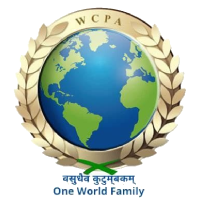WLA 17. Creates The Commission For Legislative Review
Act to Implement the Commission for Legislative Review
Short title: Legislative Review
Whereas, in accordance with the Earth Constitution, Article VIII. Sec. H – 1. The functions of the Commission for Legislative Review shall be to examine World Legislation and World Laws which the World Parliament enacts or adopts from the previous Body of International Law for the purpose of analyzing whether any particular legislation or law has become obsolete or obstructive or defective in serving the purposes intended; and to make recommendations to the World Parliament accordingly for repeal or amendment or replacement;
And whereas the provisional World Parliament notes that there are already numerous obstructive, defective or obsolete provisions in the existent world legislation, beyond the capacity of the short sessions of provisional World Parliament to fix,
And whereas the provisional World Parliament notes that the previous Body of International Law which may be adopted requires early analysis for proper integration of International Law within the Federation of Earth,
Therefore the provisional World Parliament adopts this Act to inaugurate the Commission for Legislative Review.
- The Commission for Legislative Review may begin functioning on a provisional basis. The provisional World Parliament may elect up to twelve of its members to serve on the provisional Commission. Upon commencement of the first operative stage of World Government, the World Parliament shall reconstitute the Commission for Legislative Review according to the guidelines of the Earth Constitution, Article VIII. Sec. H – 2. : “The Commission for Legislative Review shall be composed of twelve members, including two each to be elected by the House of Peoples, the House of Nations, the House of Counsellors, the Collegium of World Judges, the World Ombudsmus and the Presidium. Members of the Commission shall serve terms of ten years, and may be re-elected to serve consecutive terms. One half of the Commission members after the Commission is first formed shall be elected every five years, with the first terms for one half of the members to be only five years.”
- A role of the Commission for Legislative Review is to study the form, style and codification scheme of world legislation. The Commission for Legislative Review shall establish professional form and style guidelines. The Commission for Legislative Review shall establish standard guidelines for numerical codification of all World Legislation. This Act requires full numerical codification for all world legislation, in the same character set as used respectively in the language of translation or original drafting. The Commission may permit numerical codification to include Western numerals, Arabic numerals, Chinese numerals or other symbols and character sets of the same language. Legislation may contain Roman letters or Roman numerals in reference to provisions of the , unless the World Constituent Assembly adopts full numeric codification. This Act recommends full numeric codification to the World Constituent Assembly. Legislation may contain Roman letters or roman numerals in reference to the previous Body of International Law, but shall incorporate into world legislation using full numeric codification. In any case, the Commission for Legislative Review shall establish the same numerical codification format for all world legislation. Different language character sets may use adjustments if necessary.
Another role of the Commission for Legislative Review is to recommend amendments to the previous body of International Law that might be adopted by the World Parliament, so that the Law may be properly integrated in its initial adoption by the World Parliament or provisional World Parliament.
- Members of the World Parliament shall abide by the form, style and codification regulations of the Commission for Legislative Review if drafting bills or other proposals for the Parliament. Members of the World Parliament shall abide by the form and style guidelines if motioning for amendments of world legislation or making other parliamentary motions during deliberations. The decisions of the Commission for Legislative Review are subject to regulation by the World Parliament, by simple majority vote in joint session.
- In the event that the Commission for Legislative Review suspects that any world legislative provision is unconstitutional, the Commission for Legislative Review may bring the suspected unconstitutional provision as a case to the World Court Bench for Constitutional Cases, or to any provisional District World Court, if the Constitutional Bench is not yet functioning. Until the case is decided, the Commission for Legislative Review may publish the world legislation in a recommended form. Until the case is decided, the Commission for Legislative Review may publish with the world legislation any explanation of the reason for the recommended adjustment. If the case is decided in favor of the Commission, the Commission may publish the adjusted legislation. If the case is not decided in favor of the Commission, the Commission may still recommend that the World Parliament, or provisional World Parliament modify the offending legislation to bring it to a proper standard.
In recommendations, the Commission for Legislative Review must conserve recognition of all human, social and economic rights.
- The Commission for Legislative Review may compile, codify and publish a list of suggested amendments to the Earth Constitution. This compilation may include the specified judgment of the Commission for Legislative Review regarding the desirability or feasibility of any respective amendment. The Commission may compile pro and con arguments for any suggested amendment. The Commission for Legislative Review may publish a list of recommended amendments from the total compilation, and recommend these to the World Constituent Assembly.
- Basic Guidelines for legislative drafting:
- Use short sentences if possible. Avoid conjunctions if feasible.
- Avoid synonyms. If synonyms are necessary for apposition, always use parentheses, not commas.
- Avoid acronyms, unless full term is so cumbersome as to perhaps cause confusion in its repetition. Define any acronym in text of bill, before first use.
- Use lists if there are more than four items in a sentence grouping, or when the sentence grouping may otherwise be confusing. Number lists if in the body of the legislation.
- Use the active voice, rather than the passive voice. Use the present tense, if feasible.
- Use neither idioms, nor slang.
- Refrain from legalese if possible. For instance, use Latin terms only if necessary for concise legal clarity. Avoid wordiness (verbiage, fluff), that is, omit words that do not add meaning.
- Avoid constructions that cause ambiguity.
- Remember that “may” grants permission to act, and “shall” imposes duty to act, «is» defines, and «will» resolves commitment. «Must» is always joined with a negative, such as «must not» for stating prohibition.
- Use full numeric codification.
As long terminology is cumbersome and detracts from strength and comprehension of world legislation;
As the terms “Provisional World Parliament and World Parliament” and “Provisional World Parliament or World Parliament” are long and cumbersome terms;
As the longer terminology would in many cases require the World Parliament, when operative, to make numerous amendments to clean up the redundant and cumbersome terminology;
As a duty of the Provisional World Parliament is to polish the world legislation to the degree that further form & style amendments are not necessary to existing world legislation when the World Parliament becomes initially operative under the Earth Constitution Article 17.3.;
As the aim of the Provisional World Parliament is to enact world legislation as near as possible to the practical and effective form of an operative world parliament;
The Provisional World Parliament hereby adopts a form & style rule amendment that whenever a legislative provision is intended to apply to both the World Parliament as well as the Provisional World Parliament, that only the World Parliament be mentioned. In these cases, the term “World Parliament” includes the Provisional World Parliament.
If a clause applies exclusively to the Provisional World Parliament, only then drafters shall specify “Provisional”.
If a clause applies exclusively to the World Parliament, but not to the Provisional World Parliament, the bill drafters shall so specify.
This decision applies also to existing world legislation. In cases where “Provisional World Parliament and World Parliament” was used, the portion, “Provisional World Parliament and” is hereby stricken. In cases where “Provisional World Parliament or World Parliament” was used, the portion, “Provisional World Parliament or” is hereby stricken.
Likewise, drafters and the Commission for Legislative Review shall follow the same principle with other terminology using the partial term “Provisional”, such as when the term “Provisional World Executive or World Executive” was used, the portion, “Provisional World Executive or” is hereby stricken.
The Commission for Legislative Review shall perform the respective editing to conform existing World Legislation of the Provisional World Parliament to this decision for form & style improvement.
* * * * * * * * * *
Act To Implement the Commission for Legislative Review adopted, Noon, 25 March 2003, in Bangkok, Thailand by the sixth session of the Provisional World Parliament.
Amendments to Articles 2 and 6 adopted August 2004, in Lucknow, India, at eighth session of the Provisional World Parliament.
Article 7 was added by amendment at the 11th session of the Provisional World Parliament.
Attested : Eugenia Almand, JD, Secretary
Provisional World Parliament

